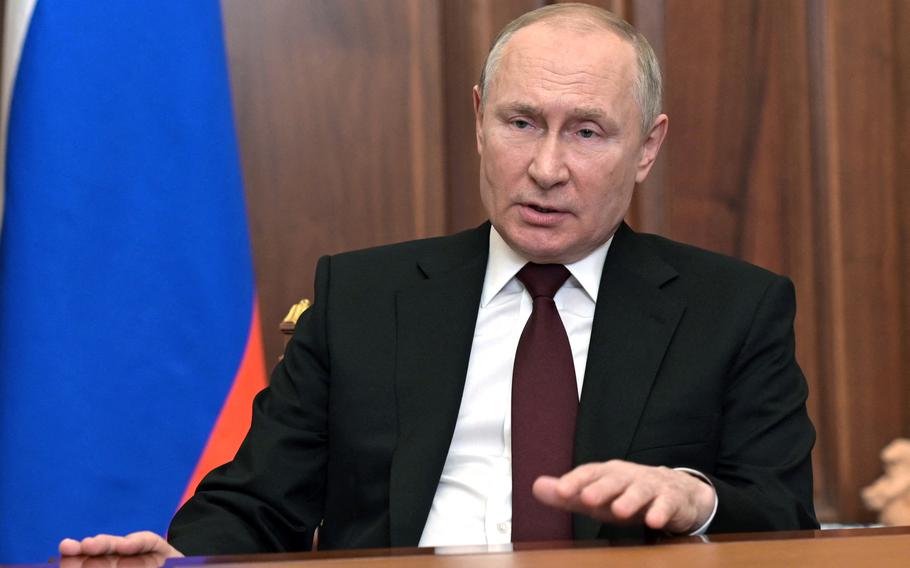
Russian President Vladimir Putin speaks during his address to the nation at the Kremlin in Moscow on Feb. 21, 2022. (Alexey Nikolsky/Sputnik/AFP/Getty Images/TNS)
On Monday morning, Russian President Vladimir Putin announced an assassination attempt targeting Russian journalists had been foiled. In a sting operation, the FSB, Russia’s domestic security service, had arrested the would-be neo-Nazi assassins, he said. Among the arsenal apparently seized by the FSB were Molotov cocktails, a grenade, several pistols and a sawed-off shotgun, as well as Nazi paraphernalia, a green wig and copies of three expansion packs to the video game “The Sims 3.” Wait. What?
On Twitter, the veracity of the sting operation came into question. “I genuinely believe this is a dumb FSB officer being told to get 3 SIMs,” tweeted Eliot Higgins, founder of the investigative research unit Bellingcat, which has covered Russia extensively.
SIM cards are small chips used in phones, which would be useful to would-be assassins. Pictured in video footage of the raid, by contrast, were boxed copies of content packs for the life simulation video game “The Sims 3,” including what appeared to be “The Sims 3: Outdoor Living Stuff,” “The Sims 3: Master Suit Stuff” and a third content pack The Washington Post could not identify.
“The Sims 3” is a game in which players control and customize virtual avatars going about their days. Players can build houses for their Sims, dress them up, and put them in all manner of wacky situations.
Video footage also showed FSB officers thumbing through a book dedicated to the writer with the phrase “signature illegible” scrawled at the bottom in Russian, raising further concerns about the sting’s credibility. One Russian journalist on Twitter pointed out, however, that “signature illegible” was the authentic call-sign of an online right-wing figure.
Still, he tweeted, “It, of course, doesn’t make the whole story convincing.”
The attack, Putin claimed, was orchestrated by Ukraine’s security service, the SBU, in league with Western partners. In a statement on the social media platform Telegram, the SBU denied plotting an assassination attempt, which they described as a fantasy concocted by Russian Special Forces.
According to the FSB, the target of the apparent assassination attempt was Vladimir Solovyev, a prominent Russian media personality who is currently the subject of both European Union and United Kingdom sanctions. Solovyev is best known as the host of a talk show on Russian state TV. Until recently, he also broadcast on YouTube, though in March, the company terminated the talking head’s account, finding it in violation of YouTube’s terms of service.
In 2019, Russian anti-corruption activist Alexei Navalny revealed that Solovyev, who frequently derides the decadence and hypocrisy of the West, owns two Italian villas.
In recent weeks, Solovyev turned his attention to Ukrainian President Volodymyr Zelensky, with Solovyev ominously predicting that if anything were to happen to him, it would be on the Ukrainian President’s orders. The SBU’s statement compared Solovyev to Nazi propagandist Joseph Goebbels, and said he would stand trial for his crimes before an international court after Ukraine’s victory over Russia.
Russian news services reported that other Russian state propagandists, including Russia Today editor in chief Margarita Simonyan, were also targets of the alleged assassins. The FSB did not identify the people it had detained, but said they were cooperating with investigators.
Monday’s sting operation harks back to the 2019 arrest of Russian investigative journalist Ivan Golunov under suspicious circumstances. Golunov, who worked for the online-only news outlet Meduza, was arrested for possession and sale of drugs. His supporters claimed the evidence police gathered from his apartment had been planted on the scene, and the charges fabricated. Several days later, Golunov was released.
Since then, Russian restrictions on independent media - particularly in the wake of the invasion - have forced many journalists, including Meduza’s staff, to flee the country. Last week, the writer, activist and Washington Post columnist Vladimir Kara-Murza was arrested in Russia and sentenced to 15 days in jail after criticizing Russia’s invasion of Ukraine in an interview with CNN. He faces a more serious 15-year charge.